The 6th International Conference on Financial Regulation and Financial Stability was held at our University
The 6th International Conference on Financial Regulation and Financial Stability was hosted by Shanxi University of Finance and Economics on November 2, and co-organized by the School of Finance, the Institute of Financial Risk Management and the Office of Applied Economic Disciplines, and supported by British Accounting Review, China Finance Review International, Economic Modelling, Economic Analysis and Policy, Journal of Chinese Economic and Business Studies, Journal of Management Science and Engineering, Financial Economics Research, Journal of Shanxi University of Finance and Economics. Nearly 100 experts and scholars from the University of Chicago Booth School of Business, the European Commission Center for Collaborative Research, School of Business and Management of Queen Mary University of London, Sun Yat-sen University, Xiamen University, and other domestic and international universities, research institutes and the financial sector, came to the venue to share their academic achievements.
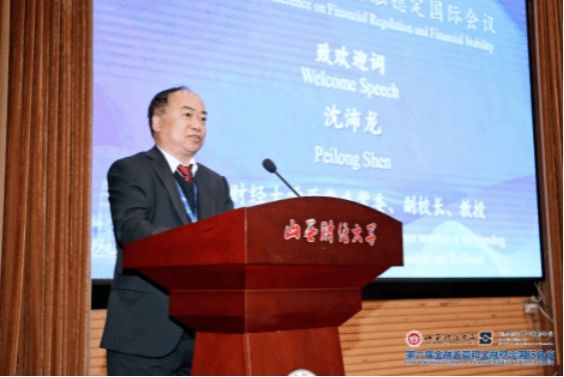
The opening ceremony and keynote speech of the 6th International Conference on Financial Regulation and Financial Stability was held in the morning of November 2nd. Prof. Li Jingping, Dean of the School of Finance, presided over the opening ceremony, and Prof. Shen Peilong, former member of the Standing Committee of the Party Committee and Vice President of the University, delivered an opening speech, expressing a warm welcome on behalf of the organizing committee of the conference to the leaders, experts and scholars attending the conference, and giving heartfelt thanks to people from all walks of life who have been caring about and supporting the development of the university. He said that the Third Plenary Session of the Twentieth Central Committee of the Communist Party of China (CPC) had particularly emphasized that national security is an important foundation for the steady progress of Chinese-style modernization. The overall concept of national security must be fully implemented, the institutional mechanism for safeguarding national security must be improved, and the positive interaction between high-quality development and high-level security must be realized, so as to effectively guarantee the country's long-term stability and security. This session focuses on major issues in the fields of financial regulation and financial stability, and it is hoped that this session will provide reference for the prevention of major financial risks and jointly make greater contributions to the study of financial regulation and financial stability. Prof. Wang Yang, Deputy Secretary of the Party Committee of Jiangxi Normal University, Prof. Xiu Dacheng of the University of Chicago Booth School of Business (also a researcher of the National Bureau of Economic Research), Prof. Zhu Xiaoneng of Shanghai University of Finance and Economics, Prof. Mallick Sushanta of School of Business and Management of Queen Mary University of London, Prof. Tan Xiaofen of Beijing University of Aeronautics and Astronautics and Prof. Jie Cui of Shanxi University of Finance and Economics, respectively, delivered the keynote speeches of the conference.
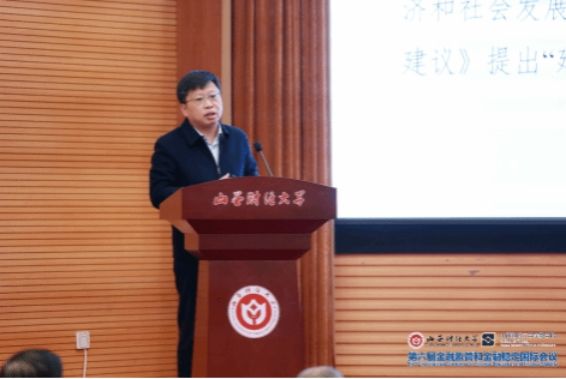
Prof. Wang Yang delivered a keynote speech entitled "Enhancing the Financial Strength of Central Banks: International Experience and Chinese Exploration". He emphasized the importance of the financial independence and sustainability of central banks from four perspectives: the monetary policy framework, financial institutions, the main responsibility of shareholders, and the enhancement of the soundness of financial institutions. On this basis, he focuses on analyzing the differences between ancient and modern Chinese central banks in terms of specific applications, principles, and other aspects of business practices; and showing the profit distribution and the strengthening of central banks in foreign central banks, such as Japan, South Korea, and the United Kingdom. Finally, Prof. Wang Yang put forward the solution strategies for central banks in developing countries when they face financial losses, such as solving the problem through the issuance of bonds by the Ministry of Finance and the carry-over of central bank profits.
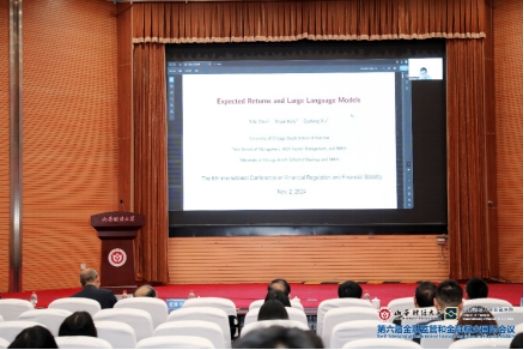
Prof. Xiu Dacheng gave a keynote speech on "Expected Returns and Large Language Models", in which he predicted stock returns through cutting-edge large language models, deeply analyzed the news, extracted the information with predictive value for stock price movements, and constructed different investment strategies. It has been found that various types of large language models, represented by Google, OpenAI, etc., are able to provide accurate quantitative descriptions of text to predict market returns. Moreover, as the complexity of the model increases, the predictive power increases, the predictive accuracy improves, and the Sharpe ratio increases significantly. He compares the performance of different models for stock prediction and finds that large language models outperform simple incremental models. He distinguishes the heterogeneity of the short-term and long-term effects of news events on stock prices and proposes a method to transform unstructured data into quantitatively structured data, which provides a new idea to improve the accuracy of stock prediction.

Prof. Zhu Xiaoneng shared a keynote speech entitled "Macroeconomic Belief Distortions in Bond Returns", in which he discussed the impact of macroeconomic expectation bias on bond pricing. It is shown that the macroeconomic expectations bias is effective in predicting bond yields and shows significant predictive power even after controlling for interest rates and other risk factors. Moreover, this predictive ability is not explained by interest rate risk or data currency effects, but by mispricing mechanisms in the market. The results of this research provide new perspectives for analyzing the factors affecting bond pricing, investors, and economic analysts.
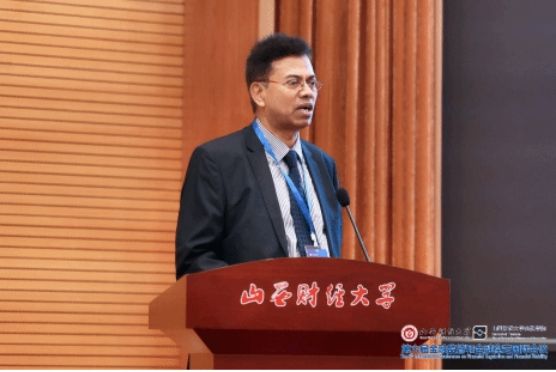
Prof. Mallick Sushanta gave a keynote speech entitled "What happens to listed firms after they obtain costly shadow loans?", discussing the impact of shadow banking on firms in China. Using data from listed firms in China, he found that shadow banking loans required a higher level of collateral and were more costly than traditional loans from formal banks. These shadow bank loans may lead to higher cost of capital for firms and lower performance in terms of profitability, productivity, investment and employment. On the other hand, state-owned enterprises (SOEs) and private firms are affected differently by shadow bank lending, with SOEs having a lower cost of funds and lower collateral requirements, while private firms face a higher cost of funds and higher call rates. Taken together, shadow bank lending, while providing financing opportunities for firms, may also have a negative impact on their long-term performance.
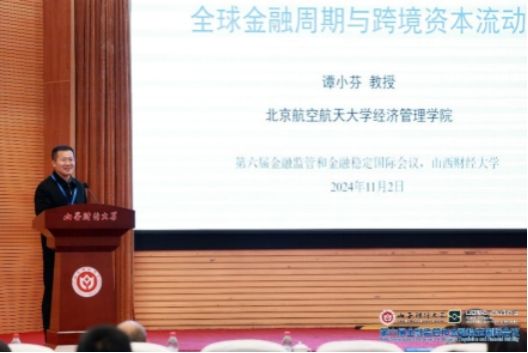
Prof. Tan Xiaofen delivered a keynote speech entitled "Global financial cycle and cross-border capital flows". He pointed out that the influencing factors of capital flows included both external and internal factors. The external factors are mainly influenced by the monetary policy of the United States, while the internal factors shift the provider of capital flows to non-banking financial institutions, i.e., bond investment is influenced by liquidity and stock investment is influenced by fundamentals. He pointed out that the current scale of global capital flows had declined, but the share of capital flows from emerging markets had risen, and the share of portfolio investment and cross-border bank lending had declined. The main reason for this was the serious problems posed by the financial crisis for various countries. Large-scale outflows from both local- and foreign-currency funds have occurred in times of crisis, suggesting that a high degree of bond market openness increases sensitivity to global risks. Even the use of local currency bonds cannot fully reduce the sensitivity to global shocks, which is especially problematic when exchange rate volatility is high and investor risk-taking is high. The research results provide a new perspective for improving various measures of cross-border capital flows in China.

Lucia Alessi, Head of the Sustainable Finance Research Team at the European Commission's Center for Collaborative Research, delivered a keynote speech entitled "The EU sustainable finance regulatory landscape". Her presentation centered on the EU's work in promoting sustainable development, particularly in the area of finance, covering five areas: farmers and sustainable development, investors and sustainability, the dual role of the financial sector, raising global ambition, and sustainable development schemes and instruments and rating systems. She presented the EU regulatory framework for sustainable finance, including corporate sustainability reporting, dual citizenship and sustainability perspectives, sustainable global regulation, green standards and green bonds, and climate transition management and benchmarking. The work of the European Union in the area of sustainable development provides useful reference for our country in continuing to promote the green transformation of industrial structure and the development of green finance.

Prof. Cui Jie gave a keynote speech on "Research on the Impact of Climate Physical Risks on the Risk Interaction Spillover Effects between the Real Industry and the Financial System", in which the impact of climate physical risks on the risk interaction spillover effects between the real industry and the financial system was studied from two dimensions, namely, the static dimension and the dynamic dimension. The study finds, first, that the level of financial exposure to physical risk inputs is relatively high under climate physical risk events, and that the magnitude of change in the volatility of financial exposure to physical risk outputs is higher than the magnitude of change in the volatility of financial exposure to physical risk inputs. Second, at the time of the natural disaster event, there is a clear trend of increasing correlation between the sample industries compared to before and after the event. Third, an increase in physical climate risk can significantly raise the level of interactive risk spillovers between the real sector and the financial system. Fourth, physical climate risk increases the level of interactive risk spillovers between the real sector and the financial system, mainly through the transmission mechanism of increasing the operational risk of real firms. Therefore, regulators, financial institutions and real enterprises should reduce the impact and influence of climate change on the financial system and the real sector by strengthening the supervision of credit quality and improving the early warning mechanism for the inclusion of financial risks.
A total of 105 conference papers were received for this session. After the selection by the paper review committee, 77 excellent papers were finally selected and shared in 16 parallel forums in the afternoon of November 2, covering 11 topics, namely "Financial Development", "Corporate Finance", "Family Finance", "Climate Finance", "Financial Risks", "Financial Markets", "Financial Technology", "Macrofinance", "Macroeconomics", "Green Finance", "Commercial Banking". Participants presented the latest research results in the financial frontier field and fully discussed and exchanged with experts and scholars in related fields.
"The International Conference on Financial Regulation and Financial Stability" has been successfully held for six times since 2019. The Conference focuses on cutting-edge issues in financial disciplines and practices, and provides a high-quality platform for academic exchanges and cooperation in order to integrate development and security, and prevent and resolve risks in key areas such as real estate, local government debt and small and medium-sized financial institutions. The School of Finance insists on promoting education and teaching reform with high-quality research results. By organizing the "China Financial Management Annual Conference" and the "International Conference on Financial Regulation and Financial Stability", the School of Finance conveys to teachers and students the most cutting-edge theories and practical developments in the discipline of finance and integrates them into the classroom teaching content. The school will continue to deepen the concept of open school running, constantly strengthen the exchange and cooperation between teachers and students of the school and the outside world, strengthening the mechanism of collaborative education in science and education, and promote the integration of industry and education, so as to contribute financial wisdom to serve the national and regional economic and social development. (Contributed by Fan Rui, School of Finance)